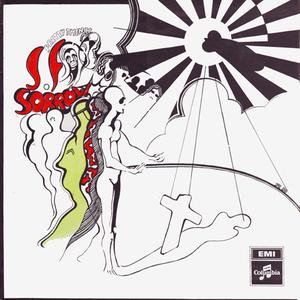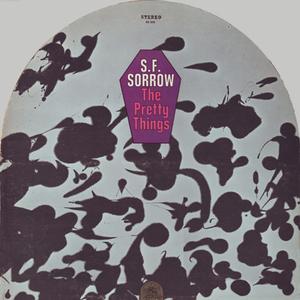Strawberry Bricks Entry:
An original member of the proto-Rolling Stones, bassist Dick Taylor hooked up with singer guitarist Phil May at London Central School of Art in 1963 to form The Pretty Things. Moving to London, their R&B-influenced rock was an instant success. In June 1964, "Rosalyn" b/w "Big Boss Man" scored the group the first of many hits in the UK, while their self-titled debut album, released in early 1965, would rise to No. 6. A few years of crazy antics and drummer Viv Prince behind them, Jon Povey and Alan "Wally" Waller (both previously in The Fenmen) joined the band in 1967 for the lavishly produced (but disappointing) Emotions. A couple of singles, including the excellent "Talkin' About The Good Times" b/w "Walking Through My Dreams" signaled the band's newfound affection for psychedelia beginning in early 1968. Drummer Skip Alan (born Alan Skipper) then went on extended holiday, with Twink from Tomorrow lending a hand on the ensuing album. The Pretties recorded S.F. Sorrow at EMI Studios with Norman Smith at the controls, around the same time that The Beatles were recording The White Album and Pink Floyd were filling A Saucerful Of Secrets. Originally a short story penned by May, the album's place in history stands as the first rock opera or, more precisely, an album that told a (rather oblique) story. Musically, it's a veritable psychedelic soundtrack, with The Beatles influence ("Private Sorrow" and "Trust") ever-present. The Pretties manage to create one of the most consistent and cohesive albums of the era by avoiding the clichés: no songs about bikes, no children's rhymes or silly effects; just a poignant, even dark exposé on the human condition. The well-written songs are sewn together with one of EMI Studios' finest productions. "Baron Saturday" approaches the epic, while the riff from "Balloon Burning" is timeless rock. Yet, like Tomorrow's debut record, the album suffered a belated release under the hand of EMI. Thus, though the album was a critical success, it was a commercial flop, failing to even secure a US release until the following year. However, Pete Townshend did take notice; The Who's Tommy would eclipse S.F. Sorrow as "the" rock opera that most would remember. Sadly, Sorrow remains a largely overlooked gem of the era.



